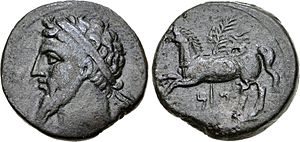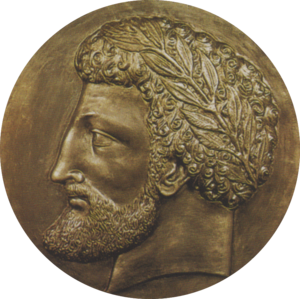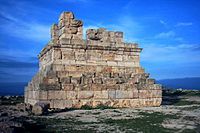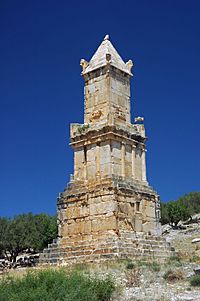Masinissa facts for kids
Quick facts for kids Masinissa |
|||||
|---|---|---|---|---|---|
| King of Numidia | |||||

Coin of King Massinissa
|
|||||
| King of Numidia | |||||
| Reign | 202 BC–148 BC | ||||
| Predecessor | New establishment | ||||
| Successor | Micipsa | ||||
| King of the Massylii | |||||
| Reign | 206 BC–202 BC | ||||
| Predecessor | Lacumazes | ||||
| Successor | Himself as King of Numidia | ||||
| Born | c. 238 BC | ||||
| Died | 148 BC (aged about 90) | ||||
| Burial | Royal tomb of El Khroub | ||||
| Spouse | Queen Sophonisba of Numidia | ||||
| Issue | Micipsa Gulussa Mastanabal |
||||
|
|||||
| Tribe | Massylii | ||||
| Father | Gaia | ||||
Masinissa (Numidian: ![]()
![]()
![]()
![]()
![]() , MSNSN; c. 238 BC – 148 BC) was an ancient Numidian king. He is famous for leading different Berber tribes during the Second Punic War (218–201 BC). He united these tribes into a powerful kingdom called Numidia in North Africa.
, MSNSN; c. 238 BC – 148 BC) was an ancient Numidian king. He is famous for leading different Berber tribes during the Second Punic War (218–201 BC). He united these tribes into a powerful kingdom called Numidia in North Africa.
Most of what we know about Masinissa comes from the Roman historian Livy. Masinissa started by fighting for Carthage against Rome. But he later changed sides, believing Rome would win. With Rome's help, he brought together the eastern and western Numidian tribes. This led to the creation of the Kingdom of Numidia.
As a Roman ally, Masinissa played a key role in the Battle of Zama in 202 BC. This battle ended the Second Punic War with Carthage's defeat. He also allowed his wife, Sophonisba, to choose her own fate instead of being paraded in a Roman victory celebration.
After the war, Masinissa's kingdom became even stronger. He helped cause the Third Punic War, which ended with Carthage being completely destroyed. This made Numidia the only major power in northwest Africa. Masinissa ruled for 54 years until he died at about 90 years old. He was a strong ally of Rome and a very active ruler. He led his troops until his death and had many children. His tomb in Cirta (modern-day Constantine) has an inscription that means "Their Lord."
The Greek historian Polybius described Masinissa as "the best man of all the kings of our time." He also said that Masinissa made Numidia, which was once unproductive, able to grow many crops. In later centuries, Numidia became known as Rome's "breadbasket," meaning it supplied a lot of grain. Today, many Berbers see Masinissa as an important historical figure and a forefather.
Contents
Early Life and Alliances
Masinissa was the son of Gaia, a chieftain of the Massylii tribe. He grew up in Carthage, which was his father's ally.
Fighting for Carthage
At the start of the Second Punic War, Masinissa fought for Carthage. He fought against Syphax, the king of the Masaesyli tribe in western Numidia. Masinissa, around 17 years old, led his Numidian and Carthaginian troops to a big victory (215–212 BC). He was also promised to marry the daughter of the Carthaginian general Hasdrubal Gisgo.
After his victory over Syphax, Masinissa led his skilled Numidian cavalry against the Romans in Spain. He helped Carthage win battles like Castulo and Ilorca in 211 BC. When Hasdrubal Barca left for Italy, Masinissa took charge of all Carthaginian cavalry in Spain. He fought a successful guerrilla campaign against the Roman general Publius Cornelius Scipio from 208 to 207 BC.
In 206 BC, Masinissa's forces, along with Carthaginian troops, met Scipio at the Battle of Ilipa. This battle greatly weakened Carthage's power in Spain.
Switching Sides to Rome
When Masinissa's father, Gaia, died in 206 BC, Masinissa and his brother argued over who would rule. This allowed Syphax to take over parts of eastern Numidia. Meanwhile, the Carthaginians were losing in Spain. Masinissa realized that Rome was winning the war. So, he decided to switch his loyalty to Rome. He promised to help Scipio invade Carthage's lands in Africa.
Scipio had captured Masinissa's nephew, Massiva, but then freed him. This friendly act helped Masinissa decide to join Rome. After Masinissa left Carthage, Hasdrubal found a new ally in Syphax. Syphax married Hasdrubal's daughter, Sophonisba, who had been promised to Masinissa.
Rome supported Masinissa's claim to the Numidian throne against Syphax. However, Syphax managed to push Masinissa out of power for a while. But then Scipio invaded Africa in 204 BC. Masinissa joined the Roman forces and helped them win the Battle of the Great Plains in 203 BC.
Victory and New Kingdom
At the Battle of Bagbrades (203 BC), Scipio defeated Hasdrubal and Syphax. While Scipio focused on Carthage, his general Gaius Laelius and Masinissa chased Syphax to Cirta. Syphax was captured and given to Scipio. After Syphax's defeat, Masinissa married Syphax's wife, Sophonisba. However, Scipio was worried about her loyalty. He asked that she be taken to Rome for a victory parade. Masinissa allowed her to choose her own fate instead.
Masinissa was now seen as a loyal ally of Rome. Scipio confirmed him as the king of the Massylii. After Syphax was captured, King Bokkar of Morocco became a vassal (a ruler under the control of another) of Masinissa.
At the famous Battle of Zama, Masinissa led the cavalry on Scipio's right side. His cavalry helped turn the tide of the battle. They chased away the Carthaginian horsemen and then attacked the back of Hannibal's army. This attack decided the battle, and Hannibal's army collapsed. The Second Punic War was over. For his help, Masinissa received Syphax's kingdom and became the King of Numidia.
Masinissa was now king of both the Massylii and Masaesyli tribes. He was completely loyal to Rome. His power in Africa grew stronger because of a peace treaty between Rome and Carthage in 201 BC. This treaty said Carthage could not go to war, even to defend itself, without Rome's permission. This allowed Masinissa to take over more Carthaginian land. Rome wanted Carthage to become weaker.
Later Life and Legacy
With Rome's support, Masinissa created his own kingdom of Numidia. It was west of Carthage, and its capital city was Cirta (modern-day Constantine). Rome liked this because it created problems for Carthage with its neighbors.
Masinissa's main goal was to build a strong, united state from the Numidian tribes. Many of these tribes were semi-nomadic, meaning they moved around. To achieve his goal, he brought in farming methods from Carthage. He also encouraged many Numidians to settle down and become farmers. Masinissa and his sons owned large farms throughout Numidia. Important towns in his kingdom included Capsa, Thugga (modern Dougga), Bulla Regia, and Hippo Regius.
Throughout his rule, Masinissa expanded his territory. Towards the end of his life, he provoked Carthage into fighting him. Carthage fought back, even though its treaty with Rome said it couldn't declare war. This led to the Third Punic War (149–146 BC). Masinissa died early in 148 BC. Ancient stories say he lived past 90 years old. He was still leading his armies when he died.
In 179 BC, Masinissa received a golden crown from the people of Delos. He had sent them a shipload of grain. A statue of Masinissa was put up in Delos to honor him. His sons also had statues on the island.
After Masinissa's death, his son Micipsa became king. Micipsa had two sons, Hiempsal I and Adherbal. They ruled for a short time before their cousin Jughurta took power. Later descendants included Juba I of Numidia and Juba II.
In Literature, Art, and Film
Masinissa's story has been told in many creative works:
- Africa (late 1330s), an epic poem by Petrarch
- Sophonisbe (1680), a German play by Daniel Casper von Lohenstein
- Cabiria (1914), a classic Italian silent film. Masinissa is played by Vitale Di Stefano.
- Scipio the African (1971), an Italian film. Masinissa is played by Woody Strode.
- Pride of Carthage (2005), a novel by David Anthony Durham
Images for kids
See also
 In Spanish: Masinisa para niños
In Spanish: Masinisa para niños
- List of kings of Numidia
 | Shirley Ann Jackson |
 | Garett Morgan |
 | J. Ernest Wilkins Jr. |
 | Elijah McCoy |







